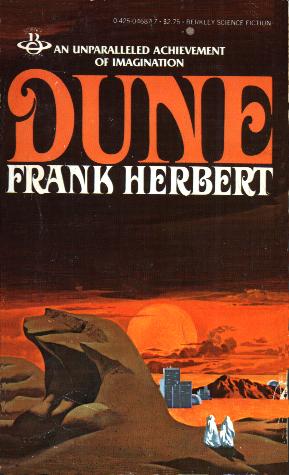“Dune†by Frank Herbert

I feel like I’ve been writing a lot about the banter between my husband G. Grod and me over book recommendations.
Lo and behold, when I went to search my blog whether I’d already written about Dune, I found this post from 2007 about recommended books.
Ha! Seven years ago! That was even before he started bugging me about Cloud Atlas.
I met G. Grod at a bar in 1995. I’m pretty sure that’s how long he’s been recommending Dune to me. We got married in 1998. He joked that he was marrying me even though I hadn’t yet read Dune. Finally in 2014 I got around to reading Dune because I chose it for the book group I lead so I’d have to read it. I tore through it, and had no trouble at all admitting he’d been right, that I’d really liked it.
Dune is the giant science fiction masterpiece about a messiah figure on a desert planet with sand worms. It’s also about dozens of more things. The reason it endures, deservedly I think, as a classic is that it’s got so much going on, including but not limited to religion, philosophy, class structure, and this all on top of it being a ripping yarn.
I must not fear. Fear is the mind-killer. Fear is the little-death that brings total obliteration. I will face my fear. I will permit it to pass over me and through me. And when it has gone past I will turn the inner eye to see its path. Where the fear has gone there will be nothing. Only I will remain.
Further, it continues to be timely because of its ecological focus, while Herbert cannily got around becoming dated by not putting that much actual science into it. Arrakis is a stand in for Iraq, which is still a point of world contention for its oil, which is allegorized in Dune as the spice that rich people come to depend on.
A few things bugged me a lot about Dune. One, the villain Baron Vlad Harkonnen, is fat and homosexual (and to boot in the Lynch movie, a redhead and with boils). Since no one else is fat or homosexual those become the markers of evil. Unacceptable.
Women’s roles in the world were somewhat troubling, too. One the one hand, characters like Jessica were powerful, and Fremen women fought alongside the men. On the other hand, all female characters were attached in some way to a male character. None of them acted freely without male authority or direction.
Finally, the world shown does not transcend a feudal structure. Yes, Paul becomes the leader and messiah but not only because of his greatness, but also because he’s the duke, and women aren’t shown in positions of power, other than in the Bene Gesserit, where they’d constantly called witches, an implication of fear of their sexual power.
If an author is going to imagine “A World Where…” then s/he can damn well imagine a world where violence against women isn’t accepted, men and women are equal, ancient boundaries of money and class break down, women aren’t called whores, and appearance and sexuality aren’t markers of character.
My husband and I watched the David Lynch film, which we found initially interesting, but eventually boring. We tried to watch the more recent mini series, but couldn’t manage, though we did watch some of the extras, which were worthwhile. If you’re going to read Dune, perhaps a better movie to watch after is Lawrence of Arabia. Paul Atreides shares a lot of similarities with that portrayal.
September 12th, 2014 at 8:23 pm
I read Dune probably thirty or even forty years ago, and I remember (as a teenager or young adult) thinking that it had a “lot going on” as you said, and even that it was profound in its philosophical speculations. I didn’t notice any of the faults you mention, but I would have been unlikely to do so back then. I did think the sequels got worse and worse until they were almost unreadable. I’m not sure I finished more than one or two., but I think there were more than that.
I wonder how Dune would read for me if I were to find time to reread it. I’m not sure it would hold up to a second visit.
September 13th, 2014 at 12:09 pm
Yep. I had a very similar reply to this book when I read it years ago. If you read any of the other books in the series, I think the issues with women characters gets even worse.
September 14th, 2014 at 9:15 am
Sherry, there were several people in our book group who revisited it after many years, and who said it did indeed stand up as a good story with many themes worth exploring. There is an afterward by the author’s son Brian who took over the series, full of good information, but sad for its between the lines longing for a present dad figure as a child.